Wham Bam
Cinderella Man isn’t quite stupendous, but it’s honest and earnest and has dignity and heart, and if you don’t respond to it on some deep-down human level there’s probably something you should have inside that’s not there.
And it’s an actual movie, which definitely qualifies it as an oddity in the current summer season. So count on this one plus Hustle & Flow, Mad Hot Ballroom, Cronicas and Hans Petter Moland’s The Beautiful Country to do the job between now and Labor Day, at the very least.
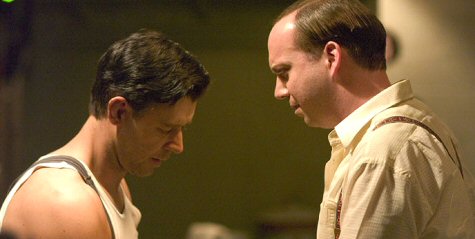
Russell Crowe as the legendary Jim Braddock, Paul Giamatti as his manager Joe Gould in Ron Howard’s Cinderella Man.
Cinderella Man is easily the best, most emotionally rewarding mainstream flick of the year so far, and that’s not a left-handed way of saying it’s the best application of traditional thematic uplift…although it is that, I suppose.
And the Fistbiscuit crack applies, yes, but there’s no turf-sharing in terms of quality.
Like Seabiscuit, Cinderella Man (Universal, 6.3) is a 1930s Depression saga about a sports figure — an Irish boxer named James Braddock (Russell Crowe) — who was up and flush in the late 20s and then down after the 1929 crash and then fighting badly and presumed to be over…like a lot of people were assuming about themselves and even the country as a whole.
< ?php include ('/home/hollyw9/public_html/wired'); ?>
But then Braddock lucked into another chance and made good on it big-time by taking the heavyweight championship title from the formidable Max Baer, who had killed a guy in the ring and maybe another one besides (a delayed response thing), and in so doing struck a chord with working people struggling to make do in that horrible period.
The mythological similarities aside, Cinderella Man has been crafted by director Ron Howard with a good deal more poignancy and grace and laid-back confidence than Gary Ross was able to summon for Seabiscuit.
And Crowe can act circles around the horse (or horses) who played Seabiscuit and he can also box like a sonuvabitch. And damned if he doesn’t look an awful lot like the real Jim Braddock…as far as his weight loss and genetic inheritance and the first-rate makeup allow for, I mean.
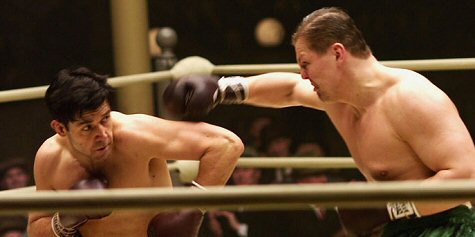
Cinderella Man also has the absolutely genius-level Paul Giamatti, who got a round of applause during the closing credits at last night’s all-media screening at Manhattan’s AMC Empire 25.
Let’s say it right here and now — Giamatti is a guaranteed lock for a Best Supporting Actor nomination next year.
It’s way too early to even think about making blanket calls about winners, but given the fact that everyone knows that Giamatti has been burned twice — last year when he wasn’t nominated for Best Actor for Sideways and the year before when the Academy ignored his American Splendor performance — he’s looking like a very heavily favored guy at this stage.
Every movie that connects with audiences (and believe me, this one will) says something that everyone including your grandfather recognizes as honest and true. The message of Cinderella Man, simply put, is that there’s nothing like getting heavily and repeatedly kicked in the ass (like having to deal with hopelessness and soup kitchens and bread lines, having no job, being unable to pay the electricity bill, seeing your kids go hungry) to give your life a certain focus.
What did I love about Cinderella Man the most, apart from the story and production designer Wynn Thomas’s convincing `30s milieu and Salvatore Totino’s cinematography and the pitchperfect performances? The fact that Howard hangs back for the most part and doesn’t push the emotional buttons too strongly.
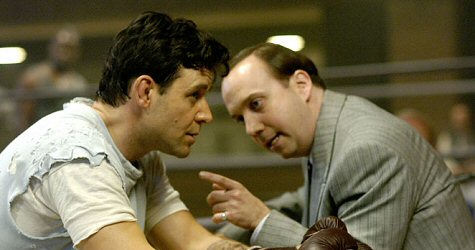
I love that after an establishing prologue of six ro seven minutes Howard takes things into a downer struggling mode and keeps them there for a full 45 minutes.
And then when the turnaround stuff finally starts to happen he doesn’t lather it and try and beat you up with it. We know that the story is a classic come-from-behind uplifter and this is why Howard is making the film, etc., but it doesn’t feel as if he’s hustling you. He’s telling a true story, after all, and holding back for the most part and just letting it come together on its own terms.
Okay, he throws in some inspirational Irish music here and there and gives us a few Ron Howard-y touches here and there, but not so you’d really notice.
Over the last few years, and particularly since he got into his 50s, Ron Howard has been getting better and better. A Beautiful Mind, The Missing (an undervalued, tough-as-nails western) and now this…perhaps the best film of his life.
Cinderella Man is longish (two hours and 20 minutes), but it doesn’t feel that way because the attention paid to this and that detail in the early sections totally pays off in the third act. Congratulations to Howard, his partner/producer Brian Grazer, and screenwriters Cliff Hollingsworth and Akiva Goldsman (A Beautiful Mind ) for deciding to let the story takes its time and in so doing imparts a certain confidence.
The climax of the down period comes when the destitute Braddock, desperate to get the power in his family’s cold-water flat turned back on, goes to a bar to beg change from his former cronies and supporters in the boxing game. It’s a painful scene, but it’s real and believable and penetrating as hell.
The five or six fight sequences are exciting and beautifully cut, and I didn’t care if they were as original as Scorsese’s Raging Bull sequences appeared back in `80.
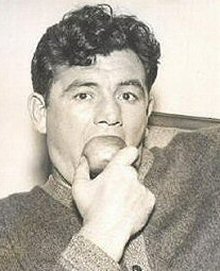
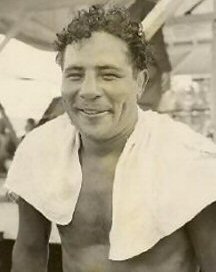
The real Jim Braddock (left) and Max Baer, in snaps taken sometime around 1934 or ’35 or thereabouts.
The big climax, which lasts about 25 or 26 minutes, depicts, of course, Braddock’s fight against the heavyweight champion Max Baer (Craig Bierko). I knew who the winner would be, but it didn’t matter because the film is so well shot and edited and you’re so heavily invested.
Crowe’s performance is a total home run. As Braddock’s wife Mae, Renee Zellweger gives her least off-putting performance since Jerry Maguire. (She almost made me forget about the last Bridget Jones film.)
Bierko’s Baer is a trip and a half. I loved his wild-ass expressions and goofing off in the ring, and how he flips this over in an instant and turns into a beast out for blood.
I loved Bruce McGill’s hard-nosed fight promoter character. McGill nails it every time (Collateral, Matchstick Men, The Insider) and has become one of most dependable character actors around, bar none.
I even found a place in my heart for Paddy Considine’s friend-of-Jim-Braddock character…a political activist-slash-working man….and that’s saying something given my lingering feelings about that “fee-fi-fo-fum” scene in Jim Sheridan’s In America.
See this movie at an early and an off-hour show this weekend and avoid the lines. They’ll be there, trust me.
Resolved
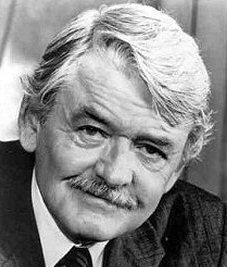
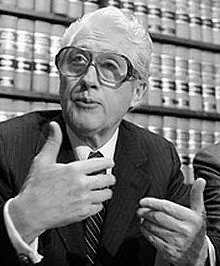
Hal Holbrook, who played “Deep Throat” in All The President’s Men (but without the moustache, and lit so darkly he was barely visible), and former FBI honcho Mark Felt (circa 1980), who’s been revealed by Vanity Fair as the actual Deep Throat who passed along hot leads about the Watergate scandal to Bob Woodward in that mythical underground garage. It’s interesting that President’s Men director Alan Pakula chose Holbrook, who vaguely resembled Felt (grey hair, shape of face and nose, etc.). It was just a coincidence, but now we finally know that Holbrook and the real guy weren’t that genetically dissimilar.
Change
Sixteen columnist Jett Wells will turn 17 on June 4th, so we changed the name of his column accordingly. Just wanted to announce this in case anyone is thrown by this. Jett will be bunking it at Hollywood Elsewhere’s Brooklyn headquarters this summer, and will be interning afternoons for columnist George Rush at the New York Daily News while taking a couple of journalism courses at NYU.

Rourke Did It
In my piece last Friday about Michael Cimino’s Year of the Dragon (just out on DVD) and particuarly Mickey Rourke’s mood hair, I asked critic and screenwriter F.X. Feeney if he could offer whatever he knows, as Feeney is a Cimino confidante from way back. F.X. replied a day or so later:
“You’re wrong [in your negative recollections about] Year of the Dragon,” he began, “and I’ll say why in a moment, but let’s first address the issue of ‘mood hair.’
“I’ve never talked with Cimino about it, though other folks who were involved in the film told me that Michael had grayed Mickey’s hair simply to give him a bit of wintery gravitas in the role. They ‘froze’ the level of gray before cameras rolled.
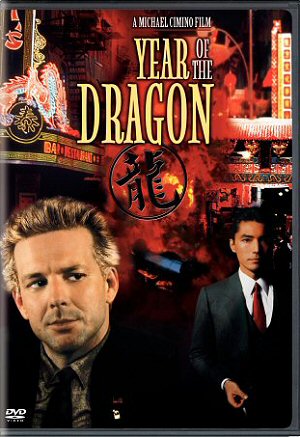
“But then Mickey, who had his own hairstylist, felt compelled to experiment. He also didn’t tell Michael, who didn’t discover the problem (he had countless other fish to fry) until it was too late to fix. Ah, well!
“Fortunately there is so much else to admire about the film. I can certainly understand why I was in the minority, loving it in 1985. The vociferous racism of Stanley White was off-putting, and to many fellow boomers watching even felt foolishly heretical, given the bloodily hard won successes of the civil rights movement in the previous two decades.
“I nevertheless felt it was authentic — I’m the cousin and nephew of cops. They’re all good yet hard-hearted guys, one way or another. They have to be. White’s roughness is even a necessary evil — he’s the guy we ask to do society’s dirty work.
“White’s displays of racism were thus redeemed in my mind by being so open. Everybody else in the room was just as racist if not more so (including all the Chinese guys) but Stanley’s prejudices were on the table for all to see. A deliberate provocation, by way of clearing the air and coming straight to the point.
“Look at how fully dimensional Joey Tai, played by John Lone, is. He’s as much the protagonist of the film as Rourke’s Stanley. Proof is in the long digressive sequence when we follow Joey high into the hills of Burma, where he meets the drug-smuggling mercenaries in whose ranks he was schooled.
“It’s a homecoming filmed with a peculiar grandeur — a kind of Palm Sunday sequence. Joey is both a messianic figure and entirely self-made. He’s capable of love and loyalty, as we see when (however deadpan) he bargains for the life and dignity of his former master. The depth of his ruthlessness (as an evil necessity in its own right, if he is to survive) comes a breathtaking instant later when he parks the severed head of White Powder Ma on the table.
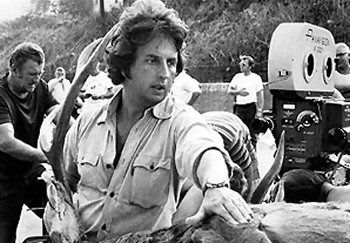
Michael Cimino during making of The Deer Hunter.
“Thus, I accept (the aptly named) White’s racism as not the point of the film, but as a bold figure in its design, just as I do that of Ethan Edwards (John Wayne) in John Ford’s The Searchers. Neither that classic nor this one is racist at heart — both are humanist films which acknowledge racism as a tragic if high energy given of the human condition.
“I’m really surprised that American film critics haven’t about-faced en masse regarding Year of the Dragon over the past 20 years. European and Asian critics have always loved it, as have audiences. I blame prejudice in the American critical establishment, against Cimino.
“John Ford’s The Searchers (one of American crix’s holiest of holies); Hong Kong action flicks, which came into its super-duper vogue three or four years after Year of the Dragon; the racism pouring from the mouths of Tarantino’s characters…these things are either tolerated without qualm or openly celebrated by American critics. And yet Year of the Dragon still gets beat up on a small technical foul like `mood hair.’ Amazing!”
Wells to Feeney: An excellent reply, F.X., and well thought-out…thanks. It’s entirely possible that the DVD release of Year of the Dragon will rejuvenate its reputation and perhaps, to some extent, even Cimino’s.
But let’s re-acknowledge that in the minds of many critics and film historians Michael Cimino will always be regarded, fairly or unfairly, as the self-indulgent pariah who singlehandledly decimated the power (psychological or otherwise) that auteur-level directors were still enoying in the film industry when Heaven’s Gate came out in ’81.
With one fell swoop this magnificent era was over after the flop of that turgid, bloated, still-ignominious film, and then Steven Bach’s “Final Cut” — the former UA exec’s first-hand recollection of the Heaven’s Gate debacle — cemented Cimono’s reputation as a guy who did more to bring this era to a crashing close than anyone or anything else.
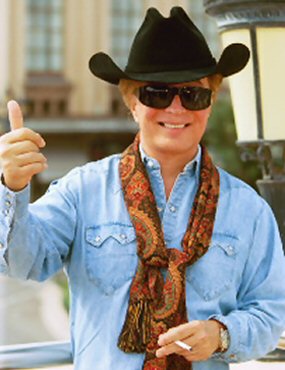
Michael Cimino in Paris in 2001.
And then Cimino became this cruious recluse and all-around weird guy. What was his thing about wearing cowboy hats all the time? I remember that straw shitkicker cowboy hat he wore during his time on the dais at a Showest in ’94 or ’95, and all the journalists there saying “what the fuck?”
Cimino has always been a filmmaker who at least deserves respect if not admiration, but he’s seemingly done everything he can to create this counter-impression of a guy whose various quirks and weirdnesses mean more to him than anything else. What’s with the radical plastic surgery and lightening his hair color and all?
These phsycal alterations probably triggered that dopey mid ’90s rumor about Cimino having had a sex-change operation. I always loved your theory about this, F.X., which is that Cimino was too visually exacting and demanding to settle for a surgically altered female version of himself…his standards were too high to allow this to happen.
I just think if Cimino really wanted to get back into things and be a normal human being again, he would just loosen and up and come out into the world and get funding for new movies somehow and just go for it. And then, probably, critics would start to take another look and reconsider or re-think things. But no…Cimino has to be “Michael Cimino” the nutbag, and that’s pretty much his doing.
Snaps

Manhattan skyline from Williamsburgh bridge — Sunday, 5.29, 5:30 pm.
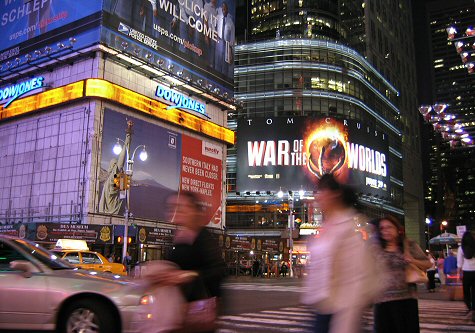
Looking northeast from corner of 7th Avenue and 42nd Street — Tuesday, 5.31, 9:05 pm…just after Cinderella Man screening.

Wall art just west of Bedford Avenue, Brooklyn.
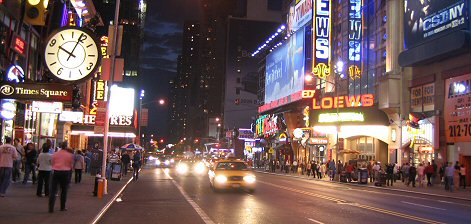
Looking west on 42nd Street toward Eighth Avenue — Tuesday, 5.31, 9:12 pm.

Most Holy Trinity church, Catholic, built in 1884 — Montrose Avenue, Brooklyn.
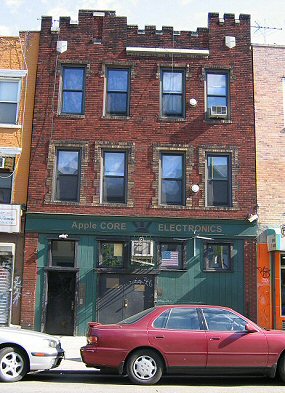
Earnest proletariat-style facade of Brooklyn headquarters of Hollywood Elsewhere during the summer of ’05.
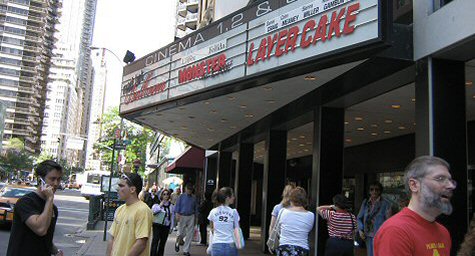
East side of Third Avenue between 59th and 60th, facing north — Sunday, 5.29, 5:40 pm.

“Neckface”-defaced Batman billboard — facing south, adjacent to Williamsburg bridge.

“The subways are rank…with the smell of urine!”

El Brilliante cafe on Montrose — a big plate of eggs, real greasy sausage, toast, hot potatoes and coffee for only $3 bucks and small change.

Main entrance of Most Holy Trinity church.
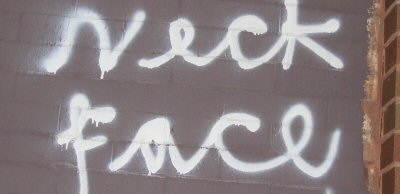
“Neckface” refrain — Bedford Avenue near 1st Street.












